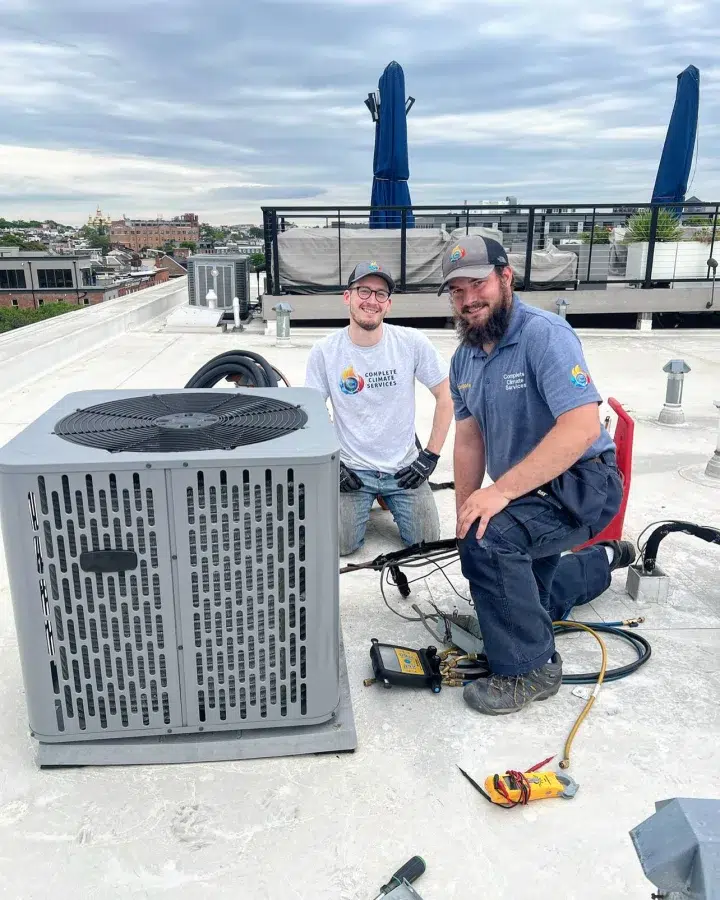When the cold starts creeping into Baltimore and Columbia, most people turn on the heat without thinking much about how it works. Depending on your setup, your house might be warmed by either a furnace or a hot water boiler heating system. Both systems do the same basic job—keeping your home warm—but go about it in totally different ways.
A furnace blows warm air through vents. A hot water boiler heating system, on the other hand, warms water and moves it through pipes or radiators to create a comfortable space. Some homeowners choose boilers because they like the quieter operation and the way heat spreads more gently in the house. Both setups have their place, especially in older Maryland homes where you’ll often find one system already in place.
Before temperatures drop lower, it can help to understand what makes these systems different. Knowing what to expect can save you headaches down the road, or help you make a smart switch if your home is due for an upgrade.
How Boilers and Furnaces Produce Heat
A furnace works by pulling in air, heating it, and sending the warm air through ducts into each room. Homes that already have ductwork for central AC often find this system familiar. The main thing homeowners notice is the fan kicking on and a rush of warm air moving through the vents.
A hot water boiler doesn’t use air. It heats up water in a main tank and then sends it through a loop of pipes feeding radiators or underfloor heating. As the hot water moves, it gives off warmth, then cycles back to the boiler to heat up again.
The heat from a furnace comes on fast, but can sometimes feel uneven—some spaces may be cozy while others stay cool. Boiler heat tends to be more even and gentle throughout the home. Plus, no blowing air means less dust and a home that doesn’t dry out as fast during winter.
Efficiency and Comfort Differences
A lot of people with boilers point out how comfortable their homes feel. That’s because boiler systems put out a steady, soft heat with hardly any noise while running. Most of the time, you barely notice it’s working.
Furnaces heat air quickly and tend to cycle on and off to manage temperature. This cycling creates little swings in warmth from room to room. Since heated air rises, areas at the top of a room may get toasty while floors are still chilly, and when the blower shuts off that warmth drops away faster.
In older homes across Baltimore, like brick rowhouses and tightly built early 20th-century styles, boiler systems often fit the space best. Their design matches homes that already rely on radiator or baseboard heat. If your place was built for a boiler setup, adding a furnace may require fitting new ducts, which adds complexity and cost.
Maintenance and Installation Differences
Maintenance is another way these systems differ. Furnaces need air filters changed regularly to keep the air clean and the blower running well. Key parts, like igniters and fans, sometimes need extra attention as they age.
A hot water boiler heating system does not use air filters, but it does need regular checks for leaks, pressure, and mineral buildup. Since water constantly moves through the system, pumps and valves work hard and eventually need replacement. Older boilers can also develop corrosion, especially if left unchecked over many years.
Installation can get tricky either way. Furnaces require existing ductwork or new vents, while boilers need working pipes and radiators in good shape. For homes already set up for baseboard or radiator heat, sticking with a boiler system is often the simplest route. Homes with central AC may find it easier to keep or add a furnace to the same ductwork.
Both systems last if you look after them, but lifespans differ. Most furnaces last between 15 and 20 years, depending on maintenance. Well cared for boilers, particularly cast iron models found in Baltimore’s older buildings, can reach 30 years or more.
Complete Climate Services provides annual system checkups, repair, and replacement for both furnaces and boilers throughout Baltimore and Columbia, helping homeowners keep their chosen systems running smoothly as winters get colder.
Picking the Right System for Maryland Winters
Maryland winters can swing quickly between mild and freezing. In Baltimore and Columbia, your heating system has to stay ready for anything.
Hot water boiler heating systems are steady performers when the cold sticks around for weeks. Their gentle, ongoing warmth works well in drafty, older homes that struggle to hold onto heat. This style keeps comfort up without a lot of temperature swings.
Furnaces, meanwhile, excel when the weather jumps from one extreme to another. Quick to heat up and easy to power down once outdoor temperatures rise, they match Maryland’s unpredictable swings between chilly and warm afternoons.
The best match comes down to more than the weather, though. Insulation levels, your home’s layout, ceiling height, and even window design all play a part. Choosing the right system often means working with what your house was built for and your own comfort preferences.
What to Expect from Either System Long-Term
Both furnaces and boilers can keep homes comfortable for years when maintained the right way. Boiler systems are valued for their quiet operation and consistent, even heat. They stir up less dust and help prevent dry winter air, making them a favorite in homes where allergies or dryness are problems.
Furnaces involve more moving parts and regular filter changes, but can quickly heat up chilly houses and handle temperature swings easily. Paired with smart thermostats, they can help cut down energy costs by heating only when and where you want it.
Both systems fit well into energy updates. Boilers can connect to advanced zone controls, giving you room-by-room heating. Furnaces work with programmable thermostats for better scheduling and improved energy use.
Knowing how your system works means fewer surprises and smarter planning when it comes time for repairs or new upgrades.
Why It Helps to Understand the Difference
Getting a handle on the basics of furnaces versus hot water boiler heating systems helps you avoid stress whenever your home needs new parts, repairs, or a full replacement. In Baltimore and Columbia, where homes come in every style and age, understanding what’s in your basement makes life a lot easier when the cold returns.
Every home, from classic rowhouses to more modern builds, needs heating that matches its bones and its owners’ needs. Knowing the pros, quirks, and upkeep for each system helps keep your place warm, safe, and worry-free through Maryland’s cold months.
FAQs
What’s the biggest difference between a boiler and a furnace?
A boiler heats water and moves it through pipes or radiators. A furnace heats air and sends it through ducts. Boiler heat is often more even and quieter, while furnaces kick on and off with more noticeable airflow.
Does a hot water boiler heating system use a lot of energy?
That depends on the system and the home. Boilers warm steadily without big bursts of power, while furnaces turn on and off. Either one can be efficient if it’s the right fit and is serviced regularly.
Can a furnace work in a house that used to have a boiler?
It can, but it might call for new ductwork or major home changes. If the house was built with radiators or baseboard heat, sticking to a boiler can be simpler and less disruptive.
Which system is quieter, a boiler or a furnace?
A boiler is usually quieter, since there’s no fan or air blowing through metal ducts. Furnaces can make a low rumble or sound from the blower when they run.
What kind of heating system is best for a rowhouse in Baltimore?
Most rowhouses were built with boilers and radiators. Those often work best, unless the house has been fully renovated for ductwork and central air. Insulation and window choices also affect what heats best.
Homes in Baltimore and Columbia that rely on a hot water boiler heating system need attention before the cold sets in. These systems work best when everything flows smoothly and parts are in good shape. If you’ve been dealing with uneven heat, slower temp changes, or just haven’t had yours checked lately, we’re ready to help. Complete Climate Services can inspect, adjust, or repair your setup so you stay comfortable all winter long. Call today to schedule a service visit.



